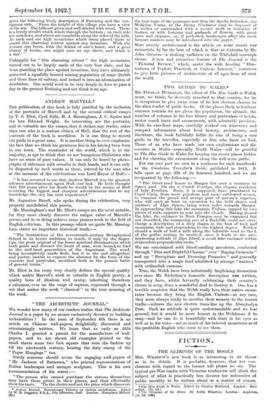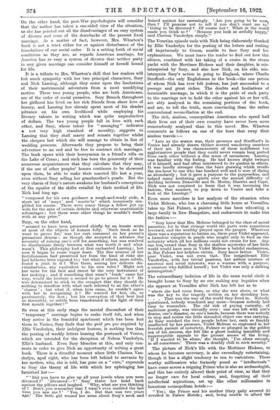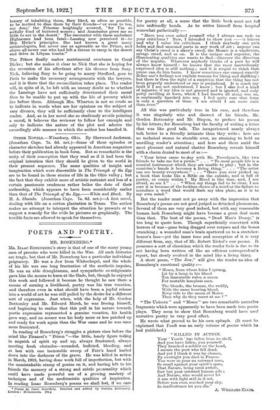FICTION.
THE GLIMPSES OF THE MOON.t
MRS. WHARTON'S new book is as interesting in its theme as in its details. It is probable, however, that her con- clusions with regard to the former will please no one. The typical pre-War reader with Victorian tendencies will think the subject of what is practically free divorce too subversive of public morality to be written about as a matter of ocurse.
• The Blue Guide to Wales. Edited by Findlay Muirhead. London : Mac- millan. 17s. 6d.] The Glimpses of the Moon. By Edith Wharton. London : Appletont Gd. net]
On the other hand, the post-War psychologists will consider
that the author has taken a one-sided view of the situation, as she has pointed out all the disadvantages of an easy system
of divorce and none of the drawbacks of the present fixed marriage. As a matter of fact, however, Mrs. Wharton's book is not a tract either for or against disturbance of the foundations of our social order. It is a setting forth of social conditions as they are, as regards American marriage, for America has so easy a system of divorce that neither party in any given marriage can consider himself or herself bound for life.
It is a tribute to Mrs. Wharton's skill that her readers will feel much sympathy with her two principal characters, Susy and Nick Lansing, although they enter upon the limitations
of their matrimonial adventure from a most unedifying motive. These two young people, who are both Americans, are of the order of social parasites. Busy Branch throughout her girlhood has lived on her rich friends from sheer love of luxury, and Lansing has already spent most of his slender pittance on his own livelihood while employing his literary talents in writing which was quite unproductive of dollars. The two young people fall in love with each
other, and Susy, whose talent for " managing " indicates a not very high standard of morality, suggests to Lansing that they shall marry and remain together whilst
the cheques last which she will manage to obtain in lieu of wedding presents. Afterwards they propose to bring their adventure to an end and be free to contract rich marriages. The book opens with their honeymoon in a friend's villa on the Lake of Como ; and such has been the generosity of their numerous acquaintances that they calculate that they may, if the use of other peoples' houses continues to be showered upon them, be able to make their married life last a year,
even without Susy selling her grandmother's pearls. But the very charm of Susy's nature awakens her husband's conceptions
of the squalor of the shifts entailed by their method of life. Nick had long ago
" composed for his own guidance a rough-and-ready code, a short set of `mays' and mustrets ' which immensely sim- plified his course. There were many things a fellow put up with for the sake of certain definite and otherwise unattainable advantages ; but there were other things he wouldn't traffic with at any price."
Busy, on the other hand,
" seemed to have been preserved chiefly by an innate scorn of most of the objects of human folly. Such trash as he went to pieces for,' was her curt comment on her parent's premature demise : as though she accepted in advance the necessity of ruining one's self for something, but was resolved to discriminate firmly between what was worth it and what wasn't. This philosophy had at first enchanted Lansing ; but now it began to rouse vague fears. The fine armour of her fastidiousness had preserved her from the kind of risks she had hitherto been exposed to ; but what if others, more subtle, found a joint in it ? Was there, among her delicate dis- criminations, any equivalent to his own rules ? Might not her taste for the best and rarest be the very instrument of her undoing ; and if something that wasn't trash ' came her way, would she hesitate a second to go to pieces for it He was determined to stick to the compact that they should do nothing to interfere with what each referred to as the other's chance ' ; but what if, when hers came, he couldn't agree with her in recognizing it ? He wanted for her, oh, so passionately, the best ; but his conception of that best bad so insensibly, so subtly been transformed in the light of their first month together ! "
So even at this early stage the mental discomfort of their " temporary " marriage begins to make itself felt, and when they arrive in the beautiful apartment which has been lent them in Venice, Susy finds that the quid pro quo required by Ellie Vanderlyn, their indulgent hostess, is nothing leas than the posting of weekly letters bearing the postmark of Venice, which are intended for the deception of Nelson Vanderlyn, Ellie's husband. Even Busy blenches at this, and only con- sents in order to give Nick an opportunity of writing a great book. There is a dreadful moment when little Clarissa Van-
dcrlyn, aged eight, who has been left behind to servants by her mother, who, she is told, has gone on a " cure," expounds
to Susy the theory of life with which her upbringing has furnished her:— "'Did you have to give up all your jewels when you were divorced ? " Divorced— ? ' Susy threw her head back against the pillows and laughed. Why, what are you thinking of ? Don't you remember that I wasn't even married the last time you saw me ? " Yes, I do. But that was two years ago.' The little girl wound her arms about Susy's neck and
leaned against her caressingly. ' Are you going to be soon, then ? I'll promise not to tell if you don't want me to.' Going to be divorced ? Of course not ! What in the world made you think so ? " Because you look so awfully happy,' said Clarissa Vanderlyn simply."
The Venetian episode ends with Nick being elaborately thanked by Ellie Vanderlyn for the posting of the letters and rushing off impetuously to Genoa, unable to face Susy and her explanations. We must leave the reader to find out how this silence, combined with his taking of a cruise in the steam yacht with the Mortimer Hickses and their daughter, is mis- interpreted by Susy, and also how Nick, on his side, mis- interprets Susy's action in going to England, where Charlie Strafford—the only Englishman in the book—the one person of whom Nick has ever felt jealous, has just succeeded to a peerage and great riches. The doubts and hesitations of terminable marriage, in which it is the pride of each party to the marriage not to hold the other against his or her will, are ably analysed in the remaining portions of the book, and are, to tell the truth, more convincing than the rather conventional reconciliation at the end.
The rich, aimless, cosmopolitan Americans who spend half their lives out of their own country have never been more remorselessly analysed than in this novel. Mrs. Wharton comments as follows on one of the laws that sway their aimless travels
" Late as the season was, their presence and Strefford's in Venice had already drawn thither several wandering members of their set. It was characteristic of these indifferent but agglutinative people that they could never remain long parted from each other without a dim sense of uneasiness. Lansing was familiar with the feeling. He had known slight twinges of it himself, and had often ministered to its qualms in others. It was hardly stronger than the faint gnawing which recalls the tea-hour to one who has lunched well and is sure of dining as abundantly ; but it gave a purpose to the purposeless, and helped many hesitating spirits over the annual difficulty of deciding between Deauville and St. Moritz, Biarritz and Capri. Nick was not surprised to learn that it was becoming the fashion, that summer, to pop down to Venice and take a look at the Lansings."
Even more merciless is her analysis of the situation when Violet Melrose, who has a charming little house at Versailles, takes up Nat Fulmer, a painter who has been educating a large family in New Hampshire, and endeavours to make him the fashion:- "Susy knew that Mrs. Melrose belonged to the class of moral parasites, for in that strange world the parts were sometimes reversed, and the wealthy preyed upon the pauper. Wherever there was a reputation to batten on, there poor Violet appeared, a harmless vampire in pearls who sought only to feed on the notoriety which all her millions could not create for her. Any one less` versed than Busy in the shallow mysteries of her little world would have seen in Violet Melrose a baleful enchantress, in Nat Fulmer her helpless victim. Susy knew better. Violet, poor Violet, was not even that. The insignificant Ellie Vanderlyn, with her trivial passions, her artless mixture of amorous and social interests, was a woman with a purpose, a creature who fulfilled herself ; but Violet was only a drifting interrogation."
The extraordinary isolation of life in the same social circle is brought home to Susy by no one making any inquiries when she appears at Versailles after Nick has loft her as to " where she had come from, or why she was alone, or what was the key to the tragedy written on her shrinking face. . . . That was the way of the world they lived in. Nobody questioned, nobody wondered any more—because nobody had time to remember. The old risk of prying curiosity, of malicious gossip, was virtually over : one was left with one's drama, one's disaster, on one's hands, because there was nobody to stop and notice the little shrouded object one was carrying. As Busy watched the two people before her, each so frankly unaffected by her presence, Violet Melrose so engrossed in her feverish pursuit of notoriety, Fulmer so plunged in the golden sea of his success, she felt like a ghost making inaudible and imperceptible appeals to the grosser senses of the living. If I wanted to be alone,' she thought, I'm alone enough, in all conscience.' There was a deathly chill in such security."
The picture of Nick's life with the Mortimer Hickses, to whom he becomes secretary, is also exceedingly entertaining, though it has a slight tendency to run to caricature. These worthy millionaires who formerly posed as " intellectuals " have come across a reigning Prince who is also an archaeologist, and this has entirely altered their point of view, so that they no longer care for local colour, and, forgetting all their intellectual aspirations, set up like other millionaires in luxurious cosmopolitan hotels :-
"Yes; the Prince and his mother (they gaily avowed it) revelled in Palace Hotels ; and, being unable to afford the luxury of inhabiting them, they liked, as often as possible, to be invited to dine there by their friends—' or even to tea, my dear,' the Princess laughingly avowed, for Pm so awfully fond of buttered scones ; and Anastasius gives me so little to eat in the desert.' The encounter with these ambulant Highnesses had been fatal—Lansing now perceived it—to Mrs. Hicks's principles. She had known a great many archaeologists, but never one as agreeable as the Prince, and above all never one who had left a throne to camp in the desert and delve in Libyan tombs."
The Prince finally makes matrimonial overtures to Coral Hicks ; but she makes it clear to Nick that she is hoping for the reversion of his affections after his divorce from Susy. Nick, believing Susy to be going to marry Strefford, goes to Paris to make the necessary arrangements with the lawyers, and it is there that the reconciliation takes place. The reader will, in spite of it, be left with an uneasy doubt as to whether the Lansings have not sufficiently deteriorated their moral fibre to be unable to put up with the life of poverty which lies before them. Although Mrs. Wharton is not so crude as to indicate in words what are her opinions on the subject of easy divorce, they will be sufficiently clear to the intelligent reader. And, as in her novel she so studiously avoids pointing a moral, it behoves the reviewer to follow her example and only to indicate the nature of the plot and admire the exceedingly able manner in which the author has handled it.




































 Previous page
Previous page